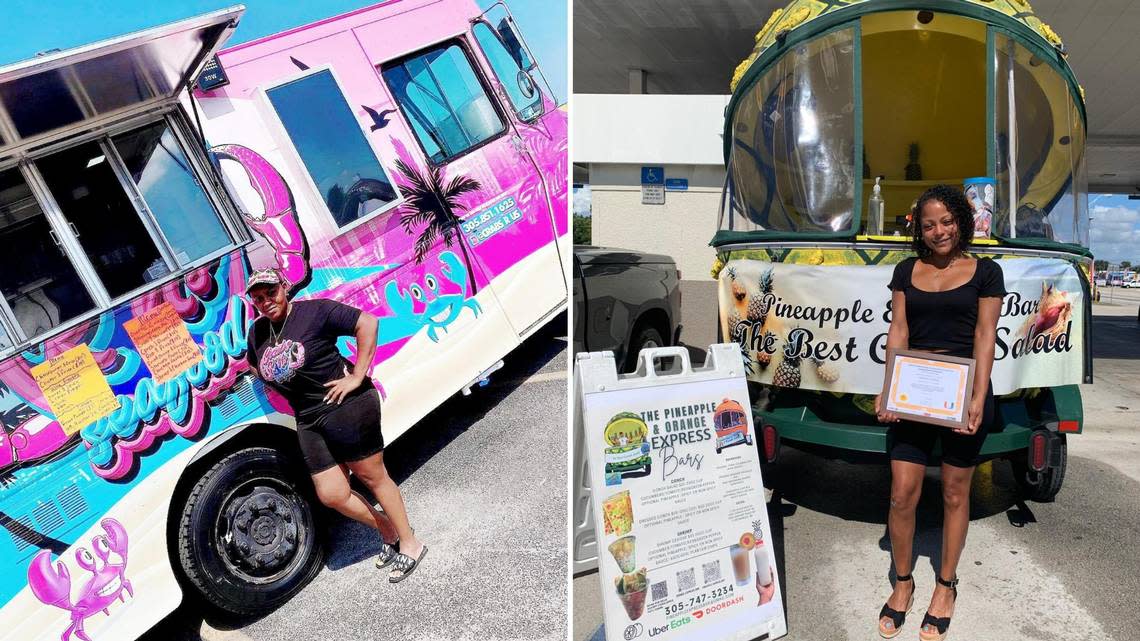‘It gave me exposure.’ Black Restaurant Week aims to assist Miami area businesses

Yvette Bruce always knew she wanted a food truck.
There was just less overhead – she didn’t have to worry about finding a location, electricity, water – so she could just focus on the only thing anybody really cared about: the food.
And she did, eventually opening Crabs R’ Us, now stationed inside NoMi Village off of the 12000 block of Northwest Seventh Avenue, in 2021. The last month, however, has been rather difficult as she noticed a slight decrease in business.
“It has been really slow and I know I’m not the only one,” Bruce said. “There’s not enough traveling going on.”
Enter Black Restaurant Week. Slated to run from Friday to Nov. 19, BRW will hope to provide a boost to all Florida eateries owned by people of African descent for the fourth consecutive year. The campaign, which travels from city to city in an effort to highlight Black-owned culinary businesses across the country, offers free publicity to restaurateurs while also fostering a network of their peers.
“It’s a community of all us dealing with same things and all of us trying to get to the same places,” Bruce said. BRW “will drive more people to my business and let the community know that there’s great Black-owned restaurants, Black-owned food trucks in Miami.”
BRW will happen less than six months after the NAACP issued a travel advisory for Florida due to state leadership being “openly hostile toward African Americans, people of color and LGBTQ+ individuals.” And while its unclear if the travel advisory has impacted local, Black-owned eateries, Miami-Dade Chamber of Commerce President Eric Knowles issued a rather prescient word of advice at the time.
“Come and support Black businesses because the Black community is being attacked,” Knowles said in May.
The organization aims to help business owners given the disparities in wealth and access to capital that many Black entrepreneurs must overcome. A 2023 Intuit Quickbooks study found that nearly 60 percent of Black participants were denied a bank loan at least once when trying to get their business off the ground compared to about 37 percent of their non-Black counterparts. That same study also revealed Black entrepreneurs needed more than 30 percent more funds – $21,000 compared to $16,000 – to start their business.
These obstacles have consequences: only 3 percent of all U.S. businesses are Black-owned, according to the latest Census data. The need was clear, which led Warren Luckett to found BRW in 2016. Its first iteration was held in Houston and has since expanded to the point where, in 2023 alone, BRW showcased more than 1200 Black-owned eateries across the United States – including Toronto and Vancouver – and generated an average of 15 percent sales increase, according to the organization.
“We really try to take the financial burden off the restaurants,” BRW managing partner Falayn Ferrell told the Miami Herald in 2022.
“Most small restaurants don’t have the financial capacity to fund a marketing campaign on their own,” added Ferrell, estimating that it could cost around $10,000.
BRW’s marketing campaign, which includes a special spot in the organization’s Florida directory, was what initially excited Katherine Hernandez. The owner of Pineapple Express Bar, Hernandez first partnered with the organization in 2022.
“It gave me exposure,” said Hernandez, whose Pineapple Express Bar food trucks can be found along Northwest 27th Avenue at 58th and 103rd streets. “I can only do so much as far as marketing. It helps with getting the word out to a side where I can’t reach and also where I don’t have time to reach.”
But just like Bruce, it was the ability to connect with fellow restaurateurs that really made the BRW partnership worthwhile. Not only can the entrepreneurs swap stories and share tips, they can find ways to support one another.
“That’s very important,” Hernandez said. “I’ve been in this eight years now and just because the people. They were a community. I met a group of people who were food truck owners who were very helpful along the way and along my journey.”
